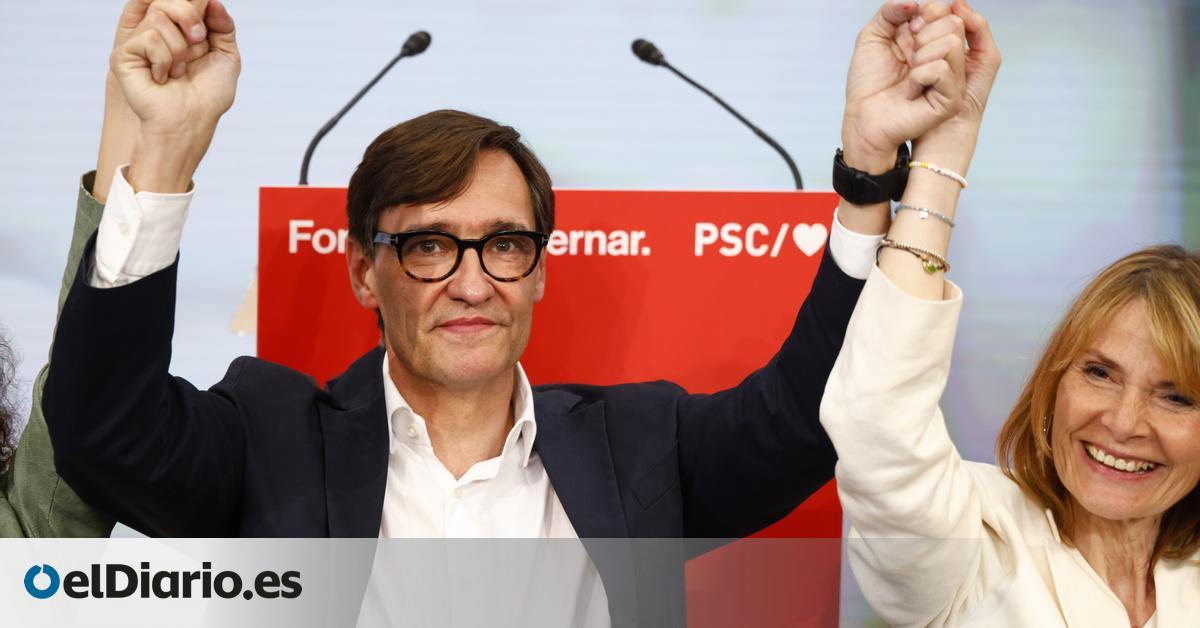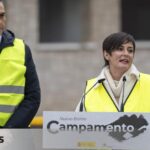
Salvador Illa made history this Sunday by winning the Catalan elections in votes and seats and with the best result for the PSC since 2003. The good numbers of the socialist candidate have broken the absolute pro-independence majority after more than a decade of uninterrupted governments of Together and ERC. Despite this, Illa will need an alliance for the investiture that may not be simple, since he will have to gather the support of Republicans and the Comuns to gain an absolute majority or, if Pere Aragonès’s party closes itself to this possibility, seek a transversal pact across left and right to try to gather support in a second vote.
“The Catalan voters have decided to open a new stage,” proclaimed Salvador Illa, who after thanking the President of the Government, Pedro Sánchez, for his support, announced that he will be nominated for the investiture as soon as the Parliament is formed. “Catalonia is getting going, with respect for everyone and with ambition,” said a happy but not euphoric Illa, unlike his closest team with whom he appeared from the PSC headquarters, where the joy was overflowing a result that, it is understood, will place Illa in the presidency of the Generalitat.
Although the victory of the PSC is overwhelming, governability is far from guaranteed, because they need 26 more deputies to reach the absolute majority or 21 to overcome an eventual ‘no’ from all the pro-independence parties. Illa could seek a left-wing alliance, with ERC and the Comuns, or also forge an alliance with Junts, in this case without needing any other party.
The sum of the left-wing tripartite, with PSC, ERC and Comuns would have an absolute majority. However, the problem for this formula could be CKD. The Republicans have maintained throughout the campaign that Illa has a proposal that is “at the antipodes” of what the Aragonès candidacy defends, who tonight has lost any hope of maintaining the presidency of the Generalitat. The Republicans, on the other hand, could assert the key to decide if they make that left-wing majority possible, for which they would have to decide whether to grant the presidency to Illa or block her, with the risk that this would mean a repeat election.
“The opposition to the Republican Government, PSC and Junts, has won. We will accept the result and ERC will go to the opposition,” Pere Aragonès assured in his appearance, after acknowledging a severe defeat. The republican leader has thus avoided any responsibility for the governability of the Generalitat, which the now outgoing president has left in the hands of PSC and Junts, two formations that can also add up although on several occasions during the campaign they have excluded each other.
The independence movement suffered a resounding defeat on May 12, above all due to the disaster of ERC and the CUP, which lost 13 and 5 deputies respectively. The decline of the pro-independence left parties is not compensated by the lower growth of Junts, which has obtained three more seats than in 2021 thanks to the revulsion that Carles Puigdemont has led to the candidacy. Furthermore, the extreme right-wing pro-independence group Aliança Catalana enters the Parliament with 2 seats, for the provinces of Girona and Lleida.
The block of parties in favor of the break with Spain had always been, at least since 2012, above 68 seats and 47% of the vote, figures that seem distant now, where the sum of Junts, ERC, CUP and Aliança has left at 61 seats and just over 43% of the votes. Since 2017, the independence movement has lost close to a million votes.
Despite the independence debacle and the fact that Carles Puigdemont has congratulated Illa on her victory, the leader of Junts has shown in his first appearance before the media that he is not throwing in the towel and that they will continue trying to win the presidency of the Generalitat with a carom. “We are in a position to build a solid Government of Catalan obedience,” said Puigdemont, who at the same time launched a cryptic warning towards the PSOE. “The distance between the first and the second in the Parliament is no different from that of the PP and the PSOE in Congress,” said the still MEP, thus reminding Sánchez that his party is key for the majority of the Government.
One of the parties that benefited the most from this election day is the PP, which has taken advantage of the disappearance of Ciudadanos like no other. The formation manages to position itself as the fourth party in the Parliament, with 15 seats (up from the 3 it had in the last legislature), surpasses Vox, which remains in the 11 seats it already had, and enters complicated areas for the party, like Lleida and Girona. The leader Alejandro Fernández has consolidated himself with his good results in front of a national PP with which he had had clashes and which had caused Alberto Núñez Feijóo to consider replacing him.
“The usefulness with which these results are assumed will be the rock on which we will build the future of the party”; Fernández has warned, who has assured that the PP “has achieved all its objectives.”
Comuns and CUP, two left-wing parties that have also been damaged in these elections, have exchanged positions in the Parliament, where Jéssica Albiach’s party now has two more deputies than the independentistas. The leader of the CUP, Laia Estrada, has made a very negative assessment of the results, which she has assured are “bad for the country” and which has highlighted the growth of right-wing forces. For their part, the Comuns have been affected, above all, by the growth of the PSC, they have lost the deputy they had in Tarragona and another in Barcelona and they have not been able to obtain the position for Girona to which they aspired.
Illa has achieved a result that follows in the wake of her victory in votes in 2021, which already provided strong results in the majority of the municipalities in the metropolitan areas of Barcelona and Tarragona, but which has now skyrocketed with also high percentages in areas from the interior of the provinces of Girona, Lleida and the interior of the province of Barcelona.
The Socialists have achieved percentages of more than 30% support in six regions and have won in 12. In Baix Llobregat and Vall d’Aran, the PSC exceeds 36% of the vote. By provinces, the PSC grows in all provinces, especially in Tarragona (+5.39 points) and in Barcelona (+4.85).
Carles Puigdemont has run a very unusual campaign. Located in the area of southern France adjacent to the Catalan border, the Junts candidate has held daily rallies in a pavilion in the city of Elna, where he has taken hundreds of his supporters every day by bus from different areas of Catalonia. But, beyond the logistical issue, the party has touched the sentimental chord of its electorate by supporting the story of Puigdemont’s return after seven years, when he will benefit from the amnesty, and turning this fact into an electoral asset.
Source: www.eldiario.es

